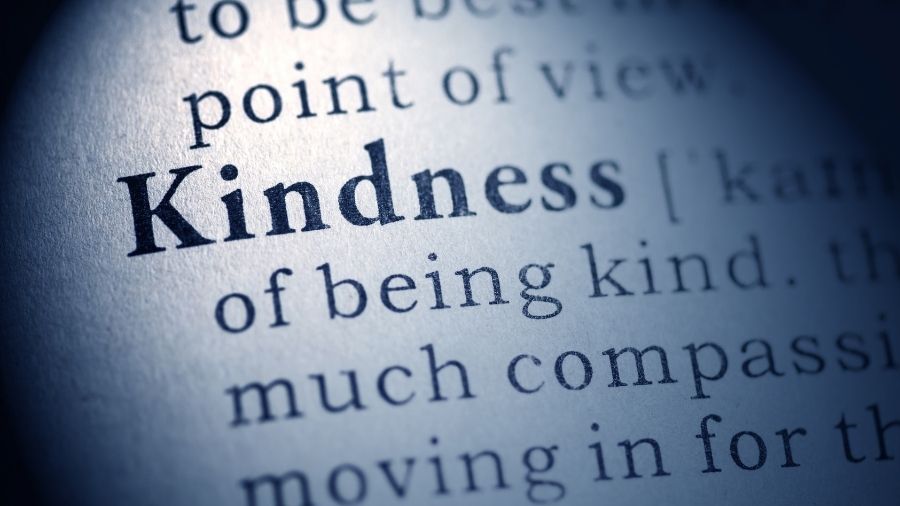Change The World With Kindness, One Person At A Time
Have you ever seen one of those amazing domino-toppling videos? An intricate pattern is set up and then the creator tips the first domino, beginning a dazzling display of movement, color, and pattern as all the dominos topple outward from that initial point. Visually, there is an incredible overall effect—but it all started with a single domino touching the one next to it, then that domino touching the one next to it, and so on.
Well, I’ve come to realize that we have the power of that first domino. The way we touch others every day has an impact (for good or ill) that ripples outward for a powerful widespread effect. Our actions and attitude can begin a chain reaction that creates beauty and harmony—or not so much. The impact reaches far beyond that one interaction.
We are all imperfect people, but I know we all want our impact to be positive and life-giving rather than the opposite. How do we do that?
In our research for The Kindness Challenge, we found that true kindness is a crucial “first domino” because it sets off an astounding chain reaction. In fact, kindness has a power to transform that is unparalleled in social science. The acts and attitudes of kindness change the essence of who we are…and then each of our relationships… and then everything around us. Like that first domino completely changes its environment, your kindness changes the world you live in.
Why is that? And how do we purposefully use it?
In today’s culture, our kindness is transformative
Can we agree that our world is in desperate need of change? We are becoming more harsh, more divided. We see a rise in “despair deaths”—alcoholism, drugs, and suicide. We’ve all bemoaned that incivility has reached epic proportions.
But our culture is not going to fix itself. Instead, we are sent by God to be that agent of change. He has given us His truth, His love, His kindness—and we are to be the potent presence that transforms everything around us.
And that means being willing to be an agent of change with—here’s the hard part—one person at a time.
There’s no such thing as engaging a culture. A culture is made of people. We engage with each individual person. Which means accepting Jesus’ mandate to truly love and treat with kindness that one person in front of us (the argumentative stepfather, the frustrating colleague, the needy friend) or that exasperating person we are debating online.
Jesus gives us no exceptions to this. We are not given permission to tweet back a cutting remark to someone who is spouting off damaging and untrue ideas. When that back-stabbing nemesis at work responds poorly and harshly to our proposal, we aren’t given a bit of leeway to badmouth him to our close colleagues. In fact, very much the opposite: We are particularly called to be kind when we most don’t want to be. (See Luke 6:27-36 as just one example.)
We can and should enforce boundaries, speak the truth, and advocate for what we believe in—but we never have the excuse to be unkind while we are doing it. Being unkind sets off the opposite domino effect—one that rarely achieves what we are going for.
Bottom line—we have to make a purposeful effort to truly be in the world (engaging even the difficult situations) without being of the world (without ever being difficult ourselves).
And when we do this, according to our national research study, here’s how those one-on-one choices will change our culture’s deep patterns of hurt.
Our kindness transforms us
The most important aspect of intentional kindness is not what it does for others, but how it changes us. We suddenly see our own “kindness blindness”—those areas we were impatient, irritated, sarcastic, defeatist or distracted that we simply didn’t notice before! Sometimes that blindness even extends to unkindness towards ourselves. And being gracious to others can echo back to us in unexpected, powerful ways.
One friend of mine has made it a habit to say hello to the people she crosses paths with on her morning run. As an introvert, it’s not her natural inclination by any means, but she chooses to make the effort. It is one simple little way of purposefully projecting kindness into a needy world. Some people respond, some don’t, and my friend could be excused for wondering if such a fleeting interaction was making any actual impact.
One young woman she regularly passed on her trail run seemed like an example of a lost cause: she always had her head down and never made eye contact… but time after time, my friend said hello anyway.
One day in the parking lot afterwards, my friend was shocked to see that young woman coming toward her. She introduced herself and poured out her story—she had been laid off, was looking for a new place to live, and was using running to help herself through it all. She thanked my friend and said her constant encouragement had really mattered to her, even though she had never shown it before now.
As you can imagine—my friend was herself encouraged and emboldened by hearing this. Both women were impacted by the most basic choice to step outside a comfort zone and simply say hello.
Kindness sets off a chain reaction
As we become more aware of being less critical and more grateful on a day-to-day basis, others around us change. Because kindness has a way of becoming the salve for many wounds. Determined caring for that difficult colleague can touch that person’s heart in a way that nothing else will.
Kindness starts a chain reaction. It replicates itself. It goes viral. In a beautiful, miraculous way, it spreads by transforming those it touches so they become carriers and pass it along.
We tested an initiative called the 30-Day Kindness Challenge that has since spread around the world. And two-thirds of participants described seeing the person they were being kind to suddenly become more gentle, caring, and attentive to others, themselves!
The people doing the 30-Day Kindness Challenge realized that they had become a sort of super-carrier: they were spreading kindness in all directions without really intending to.
Although popular culture is fascinated by stories of overnight success, our world sees far more monumental change as the byproduct of consistent small activity. Great canyons are formed by the persistence of tiny creeks. Masses of people wake up to great evils through the determined pursuit of justice by a few.
The domino pattern is created by one domino at a time doing its part to create a design that has a spectacular big-picture impact. And unlike carving a canyon, kindness dominoes often spread change with an almost astonishing rapidity. I cannot count the dozens and dozens of stories I have personally heard of those who did the 30-Day Kindness Challenge for a mother-in-law or a colleague who had been difficult for years only to see a profound transformation begin within just a few weeks!
We have the power to influence everyone we interact with
We’re all remarkably influenced by the culture around us, living and breathing certain attitudes that then become our own. We pick up certainly beliefs largely because of what others around us think. That is the power of influence.
Well, God says we have it too—with everyone we touch.
We are influencing others. We can subtly contribute to the subconscious negativity and dissatisfaction that exist in our culture. Or we can touch every person we meet with kindness, setting off a domino effect that ripples out to transform our world—one person at time.
If you are interested in having Shaunti bring research-based strategies, practical wisdom and biblical principles to your next event, please contact Nicole Owens at [email protected].
On our podcast, I Wish You Could Hear This, Jeff and I offer proven steps to help you thrive in your life, faith and relationships. In other words, we’ll offer the practical help you’ve grown accustomed to right here in this blog space. You’ll take away specific steps that help you today. Listen, follow, and share with your friends on YouTube, Apple Podcasts, Spotify and other platforms.
Please note: This post may contain affiliate links. As an Amazon Associate we earn a small amount from qualifying purchases through these affiliate links. This doesn’t cost you anything, and helps us continue bringing you great content!







